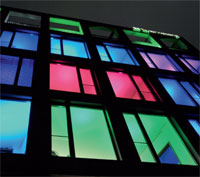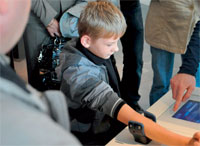Science on Stage: heading for a country near you Inspire article
How better to inspire thousands of schoolchildren across Europe than by motivating and educating their teachers? As Eleanor Hayes explains, that is the idea behind Science on Stage – a network of local, national and international events for teachers.
Initially launched in 1999 as Physics on Stage, it was the brainchild of EIROforumw1, the publisher of Science in School, and received financial support from the European Commission. In 2005, the initiative was broadened to cover all sciences and renamed Science on Stage, but the format remained essentially unchanged. National representatives organised competitions, science fairs and festivals, to identify innovative teachers and teaching activities, encourage the improvement of national education systems and establish a European community of science teachers keen to share and exchange their best teaching ideas. The size of the national activities varied – some were quite small, while the Spanish Ciencia en Acción eventw2 involved several thousand people. A number of lucky teachers from each country were then selected to attend the international festival hosted by one of the EIROforum organisations – a chance to exchange teaching ideas with 500 colleagues from more than 27 countries, attend lectures by leading scientists, take part in workshops, visit world-class research facilities and enjoy the on-stage science shows.

Most importantly, participants from the international festival then took the ideas and experience back to their own countries to share with their colleagues – sending ripples of inspiration across Europe.
One of the collaborations that emerged was between the UK and Malta: chemistry teacher Tim Harrison has made several trips to this Mediterranean archipelago to perform dramatic chemistry shows in front of thousands of school students and their teachers. Didier Robbes from the University of Caen, France, found Italian partners to set up an education company based on his electromagnetism project. And there has been much activity at the national level too: Science on Stage Belgium and Science on Stage Austria eV, for example, have presented their activities at a range of conferences and events, both for teachers and the general public (see Furtado & Rau, 2009).
In 2008, the contract with the European Commission – and thus the financial support – ran out, but the enthusiasm and commitment of the national organisers continued. In some countries, the national events had gained so much momentum that it was clear they would continue, even without the lure of an international festival. Nonetheless, it was recognised that the international festival – with the chance to swap ideas and experiences with teachers from across Europe – was an intrinsic part of Science on Stage.

The German national organisersw3 took the initiative, therefore, to plan an international Science on Stage festival in October 2008, with substantial sponsorship from THINK INGw4. Two hundred and fifty European teachers flocked to Berlin to share their teaching projects and experiments, discuss innovative methods in workshops and round tables, attend scientific talks and stage performances, and visit Berlin’s research institutes. Thus was born the idea that the national organisers should pass the Science on Stage flame from one to the other, competing to host the international festival every two years.
With this in mind, representatives from 18 European countries met on 22–23 October 2009 in Berlin to establish Science on Stage Europew5, and to decide which country should have the honour – and the responsibility – of hosting the next international festival. The national organisers from Austria, Malta and Poland made excellent bids, but the final vote went to Denmark. With generous financial support from the Danish Education Ministry, the fourth Science on Stage international festival will take place on 16–19 April 2011 in Copenhagen.
If you would like to take part in your national event – and maybe even be selected to attend the international festival – why not contact your national organisers? Between now and October 2010, an exciting range of activities will take place to select 400 of Europe’s best science teachers to spend Easter 2011 in Copenhagen
References
- Furtado S, Rau M (2009) Science on Stage: recent activities. Science in School 12: 10-13.
Web References
- w1 – EIROforum – the publisher of Science in School – is a partnership of seven European inter-governmental research organisations. For more information, see: www.eiroforum.org
- w2 – Ciencia en Acción is the Spanish Science on Stage organisation. See: www.cienciaenaccion.org
- w3 – To learn more about Science on Stage Germany, see: www.science-on-stage.de
- w4 – THINK ING is an initiative of the German Association of Metal and Electrical Industry Employers. To learn more, see: www.think-ing.de
- w5 – To learn more about Science on Stage and find your national contact, see the Science on Stage Europe website: www.science-on-stage.eu
Resources
- Teaching materials, photographs and much more information about previous festivals is available here: www.science-on-stage.net
- For more information about previous Science on Stage activities, see the following Science in School articles:
- Capellas M (2007) Science teaching flies high at Science on Stage 2. Science in School 5: 10-11.
- Furtado S (2009) Science on Stage: recent international events. Science in School 11: 11-14.
- Hayes E (2007) Awards, rewards – and onwards! Science in School 5: 12-14.
- Hayes E (2008) Science on Stage: recent activities. Science in School 10: 4-7.
- Riggulsford M, Warmbein B (2006) Space balloons, mousetraps and earthquakes: it’s Science on Stage! Science in School 1: 8-11.
- Warmbein B (2006) Science teachers take centre stage. Science in School 1: 6-7.





